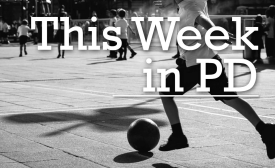sports diplomacy
The program fits neatly with the Department of Foreign Affairs and Trade's new focus on sports diplomacy. The 2015-18 strategy launched in June this year aims to use sports skills, facilities and knowledge to promote Australia and strengthen links with countries and communities in the region.
Why targeting a sporting event often feels like a direct attack at the heart of a nation […] Sport has always been seen as a manifestation of national identity. It is sometimes an outlet for our most primitive, tribal instincts, or, as the former Holland coach, Rinus Michels, put it: "Football is war."
The initiative, organized and funded by the Premier League in partnership with World Vision International and the Asian Football Development Project, will train 24 men and 12 women, including a number of Syrian refugee volunteers, who hail from World Vision Jordan, the Jordan FA, and a variety of aid organizations active within the camp.
Cowboy-hat wearing Wellington Jighere from Nigeria crushed his English opponent 4-0 at the World Scrabble Championship in Australia to become first African to bag the word game's global title. Jighere, 32, was among more than 120 competitors who travelled to Perth for the World English-language Scrabble Players' Association Championship, which culminated in Sunday's final against England's Lewis Mackay.
Globally, sports, as an industry, remains one of the unifying factors, and the games are played to bring people together. Sport is crucial in what we now call sports diplomacy. It bridges the gap and as such, South Sudanese and Kenyans are very close people.
The healing touch provided by the feel-good diplomacy for the return of Geeta from Pakistan has evaporated with the cancellation of the Delhi concert by Ghazal maestro Ghulam Ali. While the Ministry of External Affairs refuses to acknowledge any setback to India-Pakistan people-to-people relationship, the Pakistani civil society figures think otherwise.

A look at the myriad powers of sports diplomacy within the global arena.
The first World Indigenous Games is underway in Palmas, Brazil, having kicked off on October 23. Also billed as the Indigenous Olympics, the games include 2,000 athletes from dozens of Brazilian tribes, as well as indigenous groups from 22 other countries—from the United States and Russia, to New Zealand and Ethiopia.







